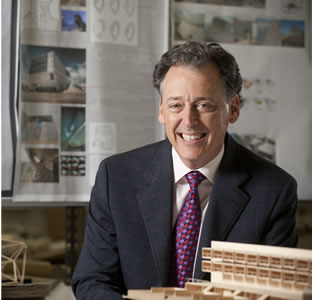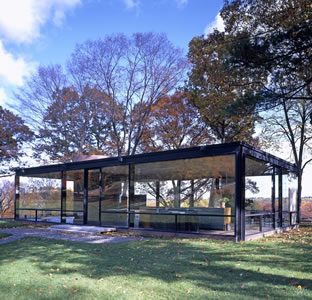UTSA Professor William Dupont named American Institute of Architects fellow


William Dupont and the Philip Johnson Glass House Estate: Dupont authored the conservation objectives for the Glass House One project after extensive assessment and site master planning work.


William Dupont and the Philip Johnson Glass House Estate: Dupont authored the conservation objectives for the Glass House One project after extensive assessment and site master planning work.
(March 8, 2013) -- The American Institute of Architects (AIA) recently named UTSA architecture professor William Dupont to its College of Fellows to recognize his career achievements in the field of architecture. An expert in heritage conservation, Dupont is the San Antonio Conservation Society Endowed Professor in Memory of Mary Ann Blocker Castleberry and director of the UTSA Center for Cultural Sustainability. He also coordinates the UTSA College of Architecture Graduate Program in Historic Preservation, where he teaches courses in historic preservation and architectural design.
Only 3,000 of the AIA's 80,000 national members have been named fellows, one of the organization's highest honors. Elevation to fellowship not only recognizes the achievements of architects as individuals, but also recognizes before the public and the profession those architects who have made significant contributions to architecture and to society. The College of Fellows shares interests among fellows, promotes the purposes of the institute, advances the profession of architecture, mentors young architects and increases service to society.
Dupont began his professional career in Philadelphia in 1986 following the completion of his architectural education at the University of Pennsylvania. He spent four years working as an historical architect for the New Jersey Historic Trust, where he administered the state's $47 million preservation grant program. From 1996 to 2007, he served as chief architect and Graham Gund Architect of the National Trust for Historic Preservation, where he provided exemplary stewardship of the organization's historic resources. The trust's purview grew from 15 to 28 sites in 15 states, ranging from an American Indian pueblo to presidential sites and masterpieces of American architecture.
Dupont came to San Antonio in the late 1990s to work on a local project, the preservation of the Walter Mathis home in the King William district, for the National Trust. He met Julius Gribou, then dean of the UTSA College of Architecture, and in 2007, Dupont joined the UTSA faculty as the San Antonio Conservation Society Endowed Professor to teach graduate courses and expand the college's historic preservation track. In 2008, he launched the UTSA Graduate Certificate Program in Historic Preservation in accordance with guidelines published by the National Council for Preservation Education. The program has certified 33 students to date. Four of the five students concurrently received the Master of Architecture degree.
Dupont teaches Architectural Conservation Theory and the Historic Preservation Seminar, which takes students to local historic sites as well as sites out-of-state to explore contemporary practices of historic preservation. He leads graduate students on academic research projects that engage places as diverse as the New Orleans Lower 9th Ward; American Indian pueblos in New Mexico; Havana, Cuba; and the San Antonio Missions. These projects provide important, real-life learning opportunities for graduate students and introduce them to leaders, best practices and new developments in the global preservation community. He also teaches advanced graduate design studio for Master of Architecture candidates, an unusual position for a historic preservation professor.
Dupont envisioned and founded the UTSA Center for Cultural Sustainability (CCS) in 2011 and serves as its director. The center is unlike any in the nation; its research extends beyond the building fabric toward an understanding of the continuity from past to future, and the connections between place and people. Dupont focuses the work on the larger context of cultural identity, traditions and heritage, viewing the built environment as a manifestation of culture. Economic and natural sustainability are considered as part of cultural sustainability.
The CCS provides academic research and services to benefit communities, completes large-scale research projects, provides opportunities for graduate students and convenes leaders in the field. Dupont believes UTSA and San Antonio are well suited for the center because of UTSA's position as a national leader in the number of architecture degrees conferred to Hispanics and the city's rich heritage and status as a place of historical significance.
Founded in 1952, the College of Fellows of the American Institute of Architects is composed of members of the institute who are elected to fellowship by a jury of their peers. The new fellows are entitled to use the designation "FAIA" following their names and will be vested in the College of Fellows at the 2013 AIA National Convention and Design Exposition in Denver on June 21. It is significant that the UTSA College of Architecture counts three FAIA among its faculty: Dupont and senior lecturers Diane Hays and Sue Ann Pemberton. A fourth, Andrew Perez, retired after the fall 2011 semester.
For more information, email Nicole Chavez.
Events
Fiesta Arts Fair features contemporary art from more than 100 artists from across the U.S., Fiesta favorite foods, drinks, live music by local and regional performers, and a Young Artists Garden providing opportunities for budding artists to learn, explore and express their creativity.
UTSA Southwest CampusJoin the PEACE Center and Wellbeing Services for Denim Day, a day of learning about the importance of consent and why we wear denim on the last Wednesday of the month each April during Sexual Assault Awareness Month. Stop by our Denim Day display to take a photo in front of our Denim Wall, spin the "Is It Consent?" Wheel, and get a Concha or goodie.
Student Union Window Lounge, Main CampusLearn to use Zotero®, a citation manager that can help you store and organize citations you find during your research. Zotero can generate bibliographies in various styles, insert in-text citations and allow you to share sources with collaborators.
Virtual EventThis event is to achnowlege the graduating seniors and induct the new cohart of scholars to our program.
North Paseo Building (NPB 5.140,) Main CampusCelebrate the accomplishments of College of Education and Human Development, College for Health, Community and Policy, College of Sciences and University College.
AlamodomeCelebrate the accomplishments of Alvarez College of Business, College of Liberal and Fine Arts and Klesse College of Engineering and Integrated Design.
Alamodome

